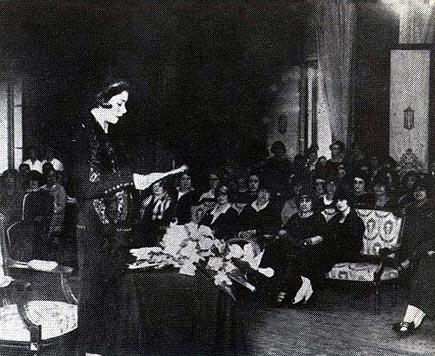like a dormant volcano of
lies
– so I seem by being so quiet
–
wearisome numbness warms me,
words ignite from my side.
I sweat ink & suffer drought,
such drought,
great drought of cuffed hands.
From the peaks of my rising breasts
from the tip of my pencil lava
flows.
Flows crooning at your feet or crying out
from a stone to the sun, on its knees
human passion plays to me:
I see cells with steel bars, clinics missing beds,
learned with atom bombs, illiterates in photographs,
widows with a husband, deeds without a home,
children bullying, bitches stoned,
a friend’s deceit, a soul’s demise.
No more! . . . I stand up & they say:
– Here goes gadabout Gloria.
– Here goes the poetizing loony lady, they say,
she never does a thing.
Yo en un Monte de Olivos
Como un volcán dormido de mentira
– parezco al parecer tan descansada –
Un ocio agotador que así me enciende,
Brotan de mi costado las palabras.
Sudo tinta y tengo sed, sed tengo,
Mucha sed de manos enlazadas.
Por la punta del monte de mis seños
Por la punta del lápiz va la lava.
Va balada a tus pies o bien protesta,
En una piedra al sol, arrodillada
Y la pasión del hombre se me representa:
Veo celdas con rejas, hospitales sin camas,
Sabios con atómicas, analfabetos con ayuda de cámara,
Viudas con marido, casos sin casa,
Niños crueles, perras apedreadas,
La traición de un amigo, la destrucción de un alma.
¡No puedo más! . . . Me levanto y dicen:
– Ahí va Gloria la vaga.
– Ahí va la loca de los versos, dicen,
la que nunca hace nada.
Como un volcán dormido de mentira
– parezco al parecer tan descansada –
Un ocio agotador que así me enciende,
Brotan de mi costado las palabras.
Sudo tinta y tengo sed, sed tengo,
Mucha sed de manos enlazadas.
Por la punta del monte de mis seños
Por la punta del lápiz va la lava.
Va balada a tus pies o bien protesta,
En una piedra al sol, arrodillada
Y la pasión del hombre se me representa:
Veo celdas con rejas, hospitales sin camas,
Sabios con atómicas, analfabetos con ayuda de cámara,
Viudas con marido, casos sin casa,
Niños crueles, perras apedreadas,
La traición de un amigo, la destrucción de un alma.
¡No puedo más! . . . Me levanto y dicen:
– Ahí va Gloria la vaga.
– Ahí va la loca de los versos, dicen,
la que nunca hace nada.
 |
| Gloria Fuertes |









